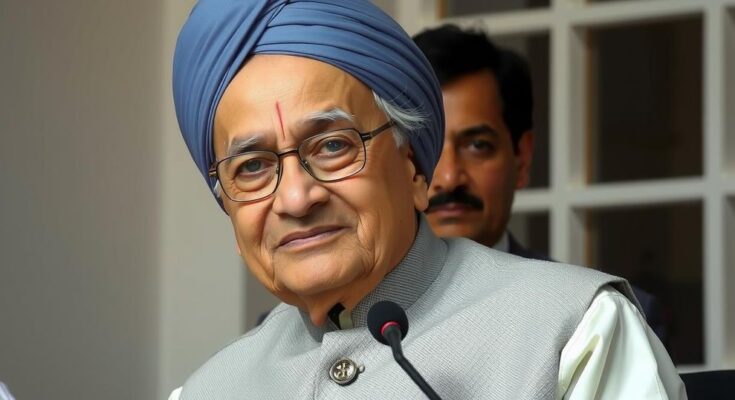Manmohan Singh, India’s first Sikh Prime Minister, died at the age of 92. He was instrumental in implementing economic reforms starting in 1991, which helped transform India into a significant economic player. Known for his humility and reticence, Singh’s legacy includes efforts towards reconciliation with Pakistan amid challenges such as poverty and political scandals.
Manmohan Singh, a distinguished figure in Indian politics and the first Prime Minister from the Sikh community, passed away at the age of 92 in New Delhi. Known for his pivotal role in transforming India into a significant economic entity, Mr. Singh’s leadership initiated transformative free-market reforms beginning in 1991. His efforts not only paved the way for substantial economic growth but also sought to enhance relations with neighboring Pakistan. Despite his impactful legacy, he was characterized by his quiet demeanor and preference for a low-profile public presence, often avoiding the media spotlight. Prime Minister Narendra Modi, in a tribute, hailed Mr. Singh as one of the country’s most respected leaders.
Manmohan Singh’s political career began in a transformative period for India, with his tenure as Finance Minister marking the onset of liberalization that has since positioned India as a major player on the global economic stage. Born in present-day Pakistan, Singh experienced the tumultuous impacts of India’s partition, which significantly shaped his early life. His moderate and diplomatic approach helped foster economic reforms while also attempting to improve India-Pakistan relations amidst historical tensions. His economic strategies greatly accelerated India’s economic growth, though challenges such as poverty persisted.
Manmohan Singh’s passing represents the loss of a significant political leader whose economic foresight reshaped India’s landscape. His contributions established the groundwork for India’s burgeoning economy while navigating complex ethnic and political challenges. As India reflects on his legacy, Mr. Singh will be remembered not only for his economic reforms but also for his humble demeanor and dedication to public service.
Original Source: www.nytimes.com




